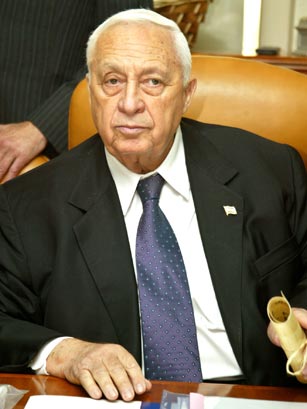
Israeli Prime Minister Ariel Sharon opens a weekly cabinet meeting at this office. Sharon convened the cabinet for a vote expected to approve a U.S.-backed "road map" leading to Palestinian statehood, despite opposition from far-right ministers
(2 of 3)
Sharon has been working behind the scenes for some time to revise the terms of the plan. Last month, he sent Foreign Minister Silvan Shalom to Washington with 14 major "comments," meaning objections, to the road map, hoping to alter it before its release. But the U.S. refused. At first, U.S. diplomats say, Israel presented more than 100 such changes. Now, they're fixing on a few key alterations that would substantially alter how the road map would proceed. The Palestinians see all this dickering over terms they believe were hashed out so thoroughly months ago as a sign Sharon intends to bog down the road map in quibbles.
Israel's right wing, which believes Sharon won re-election in January solely because he cast himself as toughest on the Palestinians, is furious that the Prime Minister has not rejected the road map outright. A lawmaker from Sharon's Likud Party set up a new pro-settlement lobby in the Knesset last week. So far, 18 of the 40 Likud legislators in the house have signed on. Domestic political pressure on Sharon will try to prevent him from conceding anything, even as a diplomatic gesture to please the U.S. The latest polls show that only one-quarter of Israelis believe Abbas' government will fight the terror groups, and 71% believe Arafat is still the one in charge. "In the Oslo peace process, we had to deliver real things and the Palestinians just talked," says Natan Sharansky, a hard-line cabinet minister who opposes the road map. "The question is whether there's a new type of regime, not just new personalities."
Many Israeli rightists take comfort in the belief that Sharon at heart isn't genuine in his advocacy of the road map. They don't see how Sharon, who in earlier ministerial jobs led the charge to build many West Bank settlements, would now agree to freeze construction. Sharon is too savvy to throw the road map in Bush's face, but rightists expect he will play for time, so that the minute Abbas fails to rein in terrorism, Sharon can seize on that as an excuse to drop the talks. This is hardly a dealmaking period for Sharon. Israeli opinion broadly favors his wait-and-see approach to the road map. And he seems confident he can walk between the raindrops of U.S. pressure to avoid doing much unless he has solid evidence that Abbas is cracking down on the terrorists — or until Abbas' failure proves the road map can't work.
Still, some around Sharon say he's serious about peace and the confirmation is the political capital he has already expended on the road map. As Foreign Minister Shalom sees it, Sharon is in line with Israeli opinion that is wary but ready to make concessions when Abbas reins in the terrorists. Last week's polls also showed that if Abbas succeeds, 61% would support a freeze on settlement construction. Before his re-election in January, Sharon declared himself in favor of eventually establishing some kind of Palestinian state, which went against long-standing opposition in the Likud — opposition formalized a year ago with a resolution by the Likud Central Committee. But the state Sharon has in mind would be a truncated area with military restrictions dictated by Israel, not the bigger entity offered by the Labor government at Camp David in 2000. Even so, right-wing parties are threatening to quit his coalition if he starts talks with Abbas and stops building new settlements.
In the Palestinian corner, Bush faces a different kind of adversary, one whose weakness makes him a problematic partner. Abbas' position is extremely vulnerable, as his rather defensive inaugural speech to the Palestinian Legislative Council in Ramallah last week showed. Outside, 200 relatives of prisoners held in Israeli jails demonstrated against his willingness to reopen talks with Sharon. "We don't recognize the new government," they chanted. "We have been deceived too many times." Inside, the 68-year-old Abbas, who prays five times daily, opened his speech with an extra Koranic dedication intended as a signal to his opponents in Hamas and Islamic Jihad that he will not surrender the religious high ground to them. Abbas warned the armed Islamists and the militia offshoots of his own Fatah Party that "pluralism does not extend to security."